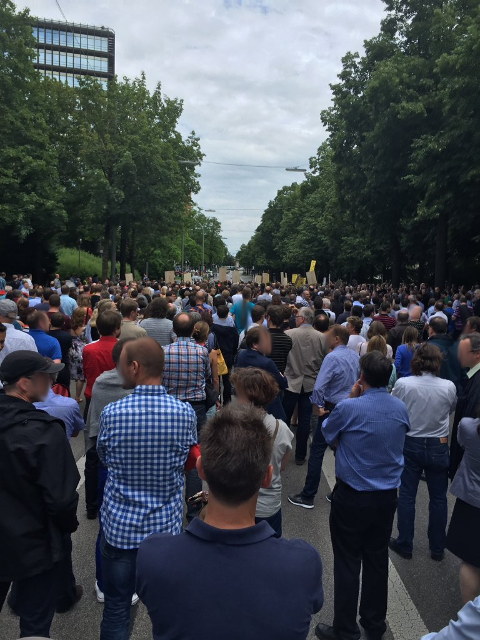

EPO protest in Munich last year
AS we already said last week, yesterday and again this morning, there's another EPO protest lined up and it will take place tomorrow, in order to coincide with the meeting of the Administrative Council (we'll be personally away those days and thus unable to cover many of the developments therein).
DEMONSTRATION
Wednesday 13 December at 12:30 Isar building
On 13 and 14 December the Administrative Council of the EPO will meet in Munich. The agenda can be found in micado as CA/105/17.
The meeting is likely to be tense: - Mr Battistelli and Mr Topic have repeatedly accused a Member of the Boards of Appeal of defamation. They even introduced a private complaint for “Beleidigung” (insult) in a German court. The court dismissed the complaint as time-barred. In the second instance the German second instance court, apparently annoyed with the complaint, went further and also dismissed the complaint on the substance. A similar complaint filed in Croatia by Mr Topic has been withdrawn by the accuser, who presumably feared a similar fate.
- The suspended Member of the Boards of Appeal filed several complaints at the ILO-AT. The first two have now been decided. The Tribunal found that the President had a personal interest in the case and was partial. It further stated that the Administrative Council erred in not finding that the President had a conflict of interest in the matter.
- The Tribunal ordered the Office to reinstate the Member of the Boards of Appeal and lift the house ban imposed upon him with immediate effect. The problem: his contract expires at the end of the year and has not been renewed so the “reinstatement” will in practice be for less than two weeks.
- The case is on the agenda of the Council as point 1.7. It is a “C” point meaning that it will again be discussed behind closed doors, again solely on the basis of information provided by the President, including confidential documents that have not been shared with the accused, and without the Board of Appeal Member being heard.
Mr Battistelli is still showing a total and utter lack of respect not only for his staff and their rights but also for the Administrative Council and for the Tribunal.
SUEPO Munich calls for a demonstration in front of the Isar building on the first day of the meeting of the Administrative Council. The aim is to signal to the Council that their governance is needed – if they want to avoid further criticism from the Tribunal.
SUEPO Munich
As previously discussed in this column, the Boards of Appeal of the EPO have a few tools at their disposal, which they use to conduct EPO appeal proceedings efficiently. In particular, Article 12(2) of the Rules of Procedure of the Boards of Appeal (RPBA) requires appellants to provide their complete case in their statement of grounds of appeal or response to an appeal.
Using this Article, the Boards of Appeal can choose not to admit evidence or amendments to a patent that are filed late in appeal proceedings.
It has generally been accepted, however, that late-filed evidence or claim amendments could be admitted into appeal proceedings, if they are a response to a filing or argument made by another party. So, for example, if a patentee-appellant files new data with their appeal to support an invention, an opponent-appellant should be able to submit counter-evidence, for example in the form of experiments. In effect, a late-filing needs to be justified by a change in circumstances.
An innovative economy is something to be celebrated, but increased numbers of patent applications can cause problems for intellectual property offices tasked with examining them. It has long been known that the European Patent Office (EPO) has a large backlog of patent applications to examine, with applicants waiting years to receive a first examination report. At the meeting of the EPI Council last week in Warsaw, I learned of a new proposal presented to Council by Alberto Casado, Vice President of the EPO, for tackling this backlog. If implemented in its proposed form then it is likely to have implications for applicants, but most notably for third parties who may be significantly disadvantaged.
In recent times, the EPO has introduced a number of initiatives known collectively as “early certainty” initiatives with the aim of speeding up the prosecution of European patent applications and the opposition proceedings for granted European patents. One of these initiatives is that the EPO aims to give preliminary opinion on patents within six months of filing the application. While the EPO has seen success under this initiative, a further initiative to reduce the average time for examination to 12 months has been less successful – the current average time for examination is just under two years. The EPO has therefore considered further measures to alleviate the backlog. One such measure is a proposal to defer examination at the EPO for up to three years on request from the applicant. I understand that the EPO thinks this will mean less time is spent examining applications that the applicants are not too concerned about. Presumably, all deferred applications will be removed from the statistics on average examination time, allowing the EPO an opportunity to drive down the numbers without actually doing any further work.